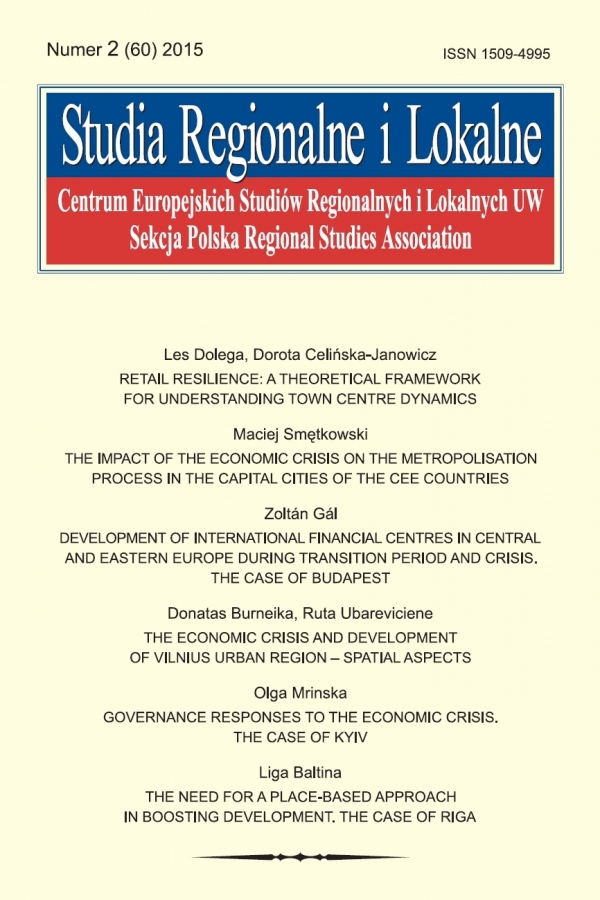Issue:
2(60)/2015
Zoltán Gál
Development of international financial centres in Central and Eastern Europe during transition period and crisis. The case of Budapest
DOI: 10.7366/1509499526003
Rozwój międzynarodowych centrów fiansowych w Europie Środkowej i Wschodniej w okresie transformacji i kryzysu. Przykład Budapesztu
Autor analizuje rozwój międzynarodowych centrów finansowych w Europie Środkowo-Wschodniej (EŚW). Badania pokazały, że rozwój usług finansowych w krajach EŚW charakteryzuje zależność zewnętrzna, gdyż tamtejsze filie firm o tym profilu są kontrolowane przez centrale zlokalizowane w krajach Europy Zachodniej. Autor porównuje w ujęciu ilościowym stopień rozwoju funkcji finansowych w Budapeszcie, Warszawie i Pradze. Dowodzi, że pomimo braku wyraźnych przejawów tworzenia międzynarodowych centrów finansowych w okresie transformacji można obecnie dostrzec sygnały świadczące o powstawaniu takich centrów. Czytelnicy znajdą w artykule ocenę wpływu światowego kryzysu gospodarczego na centra finansowe w krajach EŚW i potwierdzenie wzrostu zróżnicowania trajektorii ich rozwoju. W szczególności obserwowany był stały spadek znaczenia Budapesztu pod tym względem, szczególnie pod koniec pierwszej dekady XXI w., któremu towarzyszył jednoczesny wzrost roli Warszawy. Zoltán Gál zaznacza na koniec, że Budapeszt, pomimo wcześniejszych osiągnięć, najprawdopodobniej przegrał konkurencję jako międzynarodowe centrum finansowe.
Development of international financial centres in Central and Eastern Europe during transition period and crisis. The case of Budapest
This paper examines the development of international financial centres (IFC) in Central and Eastern Europe (CEE). The study argues that the development of the financial services in CEE is characterized by external dependency, which is manifested in the form of hierarchical command and control functions over CEE financial subsidiaries within the West European IFC network. The paper quantitatively compares the factors of IFC functions of Budapest in comparison to those of Warsaw and Prague. It argues that despite the lack of market evidence showing signs of a regional centre focus during the transition period, there are some signs of IFC formation. The paper assesses the uneven impact of the global economic crisis upon CEE financial centres and confirms that their development trajectories became more differentiated as a result of the crisis. The steady decline of Budapest during the second half of the 2000s was accompanied by the rise of Warsaw. Our analysis concluded that Budapest, despite its earlier endeavours, most likely lost the competition to become an international financial centre.
Affiliation:
Zoltán Gál: HAS Research Centre for Economic and Regional Studies, Insitute for Regional Studies, Hungary; Kaposvar University, Dept. ofRegional Economics & Statistics, Hungary-7621 Pécs, Papnövelde u. 22;
galz@rkk.hu 


